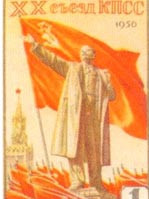
The 20th congress of the Communist party of the Soviet Union opened
On February 14, 1956 in the Grand Kremlin Palace opened the 20th congress of the Communist party of the Soviet Union in the course of which Khrushchev made its speech on the ‘personality cult’ and the overcoming of its consequences.
The revision of Stalin’s policy started right after his death in 1953 when the deeds of the state security agencies falsifying legal cases and wresting an admission of guilt from the prisoners by tortures, were made public. A whole range of cases were reviewed, innocent victims were being rehabilitated. On December 31, 1955 on the eve of the 20th party’s congress was organized a committee headed by P. N. Pospelov for studying the materials on mass repressions during the pre-war period.
The conclusions of the committee presented during the session of the Communist party Central committee presidium on February 9th, 1956 forced the party leaders to realize the need to denounce Stalin’s policy of repressions at the congress. It was decided to report on this issue during the final closed session in order to avoid the publicity of the revealed facts which showed the party itself and some of its members to disadvantage.
There was made an attempt to prepare the congress’ delegates for the recent past denunciation. They received the printed Lenin’s ‘Testament’ and ‘The letter on the national issue’ which undermined the image of Stalin. During the open sessions the official ‘Brief course of the all-Union Communist Party of Bolsheviks’ history’ and other materials on the party and state history demonstrating the features of the ‘personality cult’ were criticized.
On the last working day of the congress, on February 25, 1956, during the closed morning session N. S. Khrushchev made a report ‘On personality cult and its consequences’ where he condemned the practice of political repressions of the second half of 1930s – the beginning of 1950s, putting the whole blame on Stalin. This was done also due to the fact that the party leaders having made their career during the age of Stalin sought to decline all responsibility for the events of the time.
According the account of one of the congress participants A. N. Yakovlev, ‘a deep stillness descended on the hall. One could not hear the chairs squeak, coughs or whisper. Nobody looked at his neighbor – either because of the suddenness of what had happened or due to confusion and fear. The shock was extraordinary deep’.
When the report came to the end, the delegates adopted the resolutions approving the report and decided to distribute it among the party organizations without publishing it openly. The report was also made known to the leaders of the delegations of the parties from the states headed by communists and to the delegations of the communist parties of Italy and France which participated in the congress. To the leaders of other communist parties of the world the report was sent in the abbreviated version.
The reaction of the foreign colleagues of the Communist Party of the Soviet Union was ambiguous. The denunciation of Stalin’s policy undermined the faith in the communist ideals and led to weakening of the communists’ position in the whole world.
In spite of the attempts to keep Khrushchev’s report secret from public, on June 4th, 1956 its English translation was published in the USA. In our country the report was completely made public only in 1989 but its content started to leak from the party’s cells soon after the congress and engendered a lot of rumors. That is why on June 30, 1956 the Central Committee of the Communist Party of the Soviet Union issued a special resolution ‘On the overcoming of the personality cult and its consequences’ where it explained the position of the power regarding this issue.
For the Soviet society the 20th congress had an effect of bomb’s explosion: the citizens divided into two parties. The first one took it as the beginning of turning towards the democracy. The second one believed that the previous course was right and Khrushchev’s accusations were unfair. Both positions aroused concern among the state leaders fearing to lose control over the situation. That is why the open blame of Stalin age sounded rare and the rehabilitations were realized secretly and concerned not all innocently condemned. The issue of repressions was brought up again only during Perestroika years.
Lit.: Бычков Л. Н. Двадцатый съезд КПСС // Большая советская энциклопедия. Т. 7. М., 1972; Наумов В. П. К истории секретного доклада Н. С. Хрущёва на XX съезде КПСС // Новая и новейшая история. 1996. № 4; О культе личности и его последствиях // Известия ЦК КПСС. 1989. № 3; То же [Электронный ресурс]. URL: http://www.hrono.ru/libris/stalin/16-19.html; Сидорова Л. А. Оттепель в исторической науке: советская историография первого послесталинского десятилетия. М., 1997; XX съезд Коммунистической партии Советского Союза. Стенографический отчёт. Т. 1-2. М., 1956; То же [Электронный ресурс]. URL: http://publ.lib.ru/ARCHIVES/K/KPSS/_KPSS.html#020.
Based on the Presidential Library’s materials:

